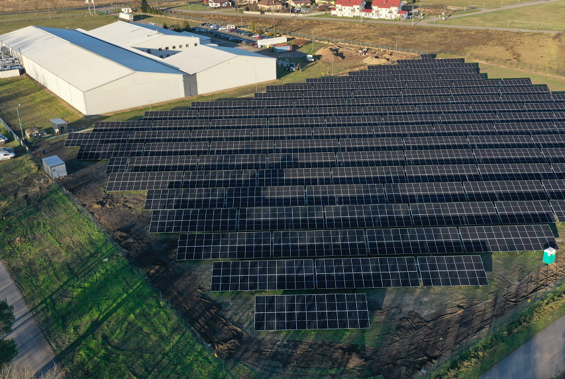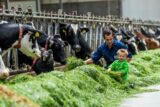The 1620 MWh per year solar power plant was officially opened this week securing business continuity in an area with frequent power cuts and creating a renewable energy source in an energy grid with an otherwise high carbon factor.
Tychowo, Poland: Power cuts and dropouts have been reoccurring obstacles for the 98 employees working at Arla Foods’ repackaging site in Poland. Already a challenge to business continuity, the war in Ukraine and subsequent shortage in energy supply have only highlighted the need for a better and more sustainable solution. This week, the solution was taken into use with an official opening of a new solar power plant located on site.
Producing an estimated 1620 MWh per year, the new solar power plant will deliver about 85 per cent of the site’s total energy consumption. And with the ability to store an additional 2,6 MWh in a battery, the investment will also be able to partly power the site at night adding to the stability.
Said David Boulanger, Executive Vice President and Head of Supply Chain: “This is a sensible investment on all levels. Not only does it make securing business continuity easier for our employees, it also reduces run rate costs at the site and creates a more sustainable energy source showing the way for future energy investments in the region.”
Even if there was a way to secure a more stable supply of electricity from the Polish energy grid, the watts running through the power cables wouldn’t have a positive impact on carbon emissions. The Polish energy grid is heavily reliant on coal and with 1,02 tonnes CO2e per MW produced, the carbon factor is significantly higher than other European markets Arla Foods has operations in. Installing its own solar power plant, Arla Foods is able to reduce emissions by 1645 tonnes per year.
Concluded Boulanger: “At Arla Foods, we want to lead in sustainable dairy. That also means, that if there isn’t a sustainable solution in place, we will go the extra mile and create our own and that is exactly what we have done in Tychowo. Even if it’s not one of our biggest sites in terms of energy consumption, it shows that we put action behind our words when it comes to improving our operations and use 100 per cent renewable electricity in Europe by the end of 2025.”
As a third aspect in the triple win, the run rate cost will be reduced by more than 75 per cent per year resulting in the 2,99m EUR investment paying itself back within approx. 7 years (depending on local electricity prices).
The Tychowo solar power plant is the newest investment in renewable energy from Arla Foods after entering a massive 250.000 MWh per year partnership in Denmark and installing a 2500 MWh per year solar power plant in Bahrain. Renewable energy is an important step in Arla’s ambition to make its production even more sustainable and achieve an emissions reduction of 63 per cent compared to 2015 by 2030. For more visit arla.com



